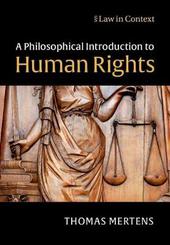
|
A Philosophical Introduction to Human Rights
Hardback
Main Details
| Title |
A Philosophical Introduction to Human Rights
|
| Authors and Contributors |
By (author) Thomas Mertens
|
| Series | Law in Context |
|---|
| Physical Properties |
| Format:Hardback | | Pages:310 | | Dimensions(mm): Height 250,Width 174 |
|
| Category/Genre | Social and political philosophy |
|---|
| ISBN/Barcode |
9781108416313
|
| Classifications | Dewey:323.01 |
|---|
| Audience | | Tertiary Education (US: College) | | Professional & Vocational | |
|---|
| Illustrations |
Worked examples or Exercises
|
|
Publishing Details |
| Publisher |
Cambridge University Press
|
| Imprint |
Cambridge University Press
|
| Publication Date |
24 September 2020 |
| Publication Country |
United Kingdom
|
Description
While almost everyone has heard of human rights, few will have reflected in depth on what human rights are, where they originate from and what they mean. A Philosophical Introduction to Human Rights - accessibly written without being superficial - addresses these questions and provides a multifaceted introduction to legal philosophy. The point of departure is the famous 1948 Universal Declaration of Human Rights, which provides a frame for engagement with western legal philosophy. Thomas Mertens sketches the philosophical and historical background of the Declaration, discusses the ten most important human rights with the help of key philosophers, and ends by reflecting on the relationship between rights and duties. The basso continuo of the book is a particular world view derived from Immanuel Kant. 'Unsocial sociability' is what characterises humans, i.e. the tension between man's individual and social nature. Some human rights emphasize the first, others the second aspect. The tension between these two aspects plays a fundamental role in how human rights are interpreted and applied.
Author Biography
Thomas Mertens is a specialist on the relationship between law and morality. He has published extensively on human rights, Kant's moral and legal philosophy, the just war tradition and law and morality in Nazi-Germany. He teaches at Radboud University Nijmegen and has also held adjacent positions at Leiden University and Catholic University Leuven.
Reviews'Thomas Mertens has long been admired as a political and legal philosopher, equally at home in Anglo-American and German thought, who writes with unusual insight about the most important issues in his field. His argument in this book is that human rights are central to the great debates of philosophy of law and it will persuade its audience by the clarity of its exposition and by its adroit and effective use of real-world examples.' David Dyzenhaus, University Professor of Law and Philosophy, University of Toronto 'Thomas Mertens' new book on human rights is a highly perceptive and comprehensive examination of the key questions that are raised by the topic. Mertens sets human rights in the context of legal philosophy and analyses in a systematic way the relationship between morality and law; natural law and positive law; international law and national law. A legal Kant scholar of renown, Mertens turns his attention with good effect to the legal and philosophical study of human rights. Written with freshness and clarity, the book will be accessible to all students of law, politics and philosophy, and members of the public with an interest in the topic. The book is vital reading for the twenty-first century. It demonstrates how we owe a good deal to the war-torn, but ultimately progressive, twentieth century. There are countless interesting examples that are drawn from that turbulent century which enliven the discussion.' Howard Williams, Honorary Distinguished Professor, Cardiff University 'Thomas Mertens' book is much more than a handbook on human rights: it uses this topic as a starting point for introducing the readers to philosophy of law and its many questions. Given the centrality of human rights in our societies, this is a justified, clever move. While analysing some major rights as they are stated by the UDHR, Mertens discusses a wide range of arguments for and against their universal or absolute character. In doing so, he invites us to an intellectual tour de force in which history of philosophy and theoretical argumentation are ingeniously intertwined. This ambitious endeavour goes together with philosophical honesty and restraint: the author never forces his position on the readers; he just presents them with the philosophical tools to form their opinion. Also for this reason, this compelling introduction to philosophy of law is highly enjoyable and instructive.' Alessandro Pinzani, Professor of Political Philosophy at the Federal University of Santa Catarina (UFSC), Brazil
|